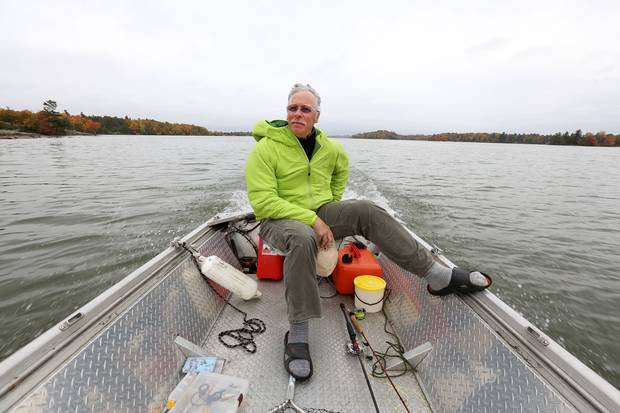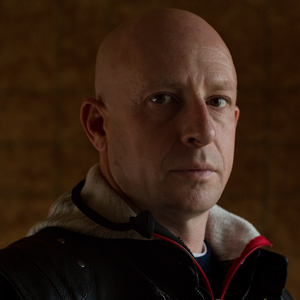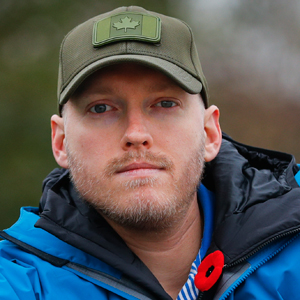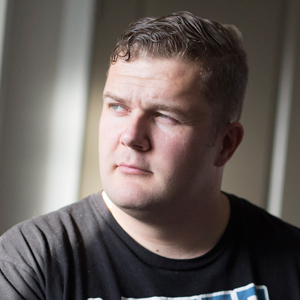This article is part of The Unremembered, a Globe and Mail investigation into soldiers and veterans who died by suicide after deployment during the Afghanistan mission.
His grandfather spent time in the black hole and probably his father, too. Three generations of soldiers in Rob Martin's family have spent time struggling with post-traumatic stress disorder and each had a different war and a different name for the darkness.
For his grandfather in the First World War, the injury was known as shell shock. For his father in the Second, it was battle fatigue. For Mr. Martin, a retired lieutenant-colonel now 57, the shorthand is PTSD. Where others greet the injury with shame and fear, Mr. Martin says embracing PTSD and recognizing its permanence has changed his life, allowing him to again feel emotion and generosity toward others.
Still, some days the black hole haunts him. Only 14 months ago he had a noose around his neck. Other times, he's felt a nearly irresistible urge to drive into a bridge pillar or dump truck. A recent Monday was a bad day, too. When those moments come, he is his own one-man emergency response team, burning up the phone lines to get help – from therapy and medication to at least a half-dozen programs designed to pull veterans from the brink.
He joined Project Healing Waters Canada, a support group that teaches wounded veterans to fly fish. The focus required to learn to tie a fly and cast a line helped him leave the black hole and find a fishing hole. He took part in Can Praxis, an equine therapy program, where he and his daughter had sessions with horses. "A horse reads your cues and either trusts you or it doesn't," Mr. Martin said. "There are no games with a horse."

Mr. Martin joined a few programs to help him with his PTSD, including an equine therapy program, and a support group that teaches wounded veterans to fly fish.
Photos courtesy Rob Martin
He did a week-long sea kayaking trip with Outward Bound Canada along with programs offered by the Veterans Transition Network and Wounded Warriors Canada. For a time he had a companion dog, a German shepherd named Thor.
The programs share some common goals – to get veterans active and out of their own heads, to expose them to therapists outside a clinical setting and to meet people who may share their experience.
"If I hit a trigger I can be back in the black hole tomorrow," Mr. Martin says, sitting on the patio of the peaceful lakefront cabin he's rented north of Kingston, Ont., where he does a lot of fishing. "It stays with you for life, so you learn how to work with it, not against it. My PTSD is now part of who I am but I'm still blessed."
Mr. Martin enlisted as a high-school dropout in 1976 "at the toe of my mother's shoe," as he describes it. A veteran of the Cold War, Mr. Martin loved Arctic postings to Inuvik and Alert. He was a Morse code intercept operator and learned Russian.
Mr. Martin was commissioned from the ranks into the officer corps, which meant postings abroad – often away from his five children.
Sept. 11, 2001 changed everything. Within three months he was in Afghanistan to help hunt for Osama bin Laden, the Taliban and al-Qaeda operatives. "Compared to later years in the war, it was a relatively benign battle space," Mr. Martin recalled, but "it was an exhausting and unrelenting tour."

Mr. Martin in Afghanistan.
Photo courtesy Rob Martin
He emerged from his 2002 tour angry and hypersensitive. He recalls filling out a military form where he reported suicidal thoughts but there was no follow-up. Soon he was home snapping at his children. His then-wife told him he needed help. Even his young daughter noticed he stopped playing with her. "She broke my heart when she told me that just last year," Mr. Martin said.
By 2006, Mr. Martin was 47 and promoted to lieutenant-colonel. He was still a high achiever at work but he was told not to apply for more advanced training. Superiors thought he was too close to retirement even though he had no plans to leave. "It was a kick in the teeth," he said.
Then, in 2008, came the chance to go back to Afghanistan as a senior signals intelligence officer charged with intercepting enemy communication.
Along with many Afghans and coalition soldiers, 25 Canadians died on that tour and Mr. Martin felt responsible for each one. Early on, Captain Jonathan Snyder fell into a well and died while on patrol. "He drowned in the desert. I was suddenly struck by the futility of war," Mr. Martin said.
Canadian journalist Mellissa Fung was kidnapped and he spent an intense month on the successful search for her. He helped track down a team of insurgent bombers who killed Canadians using new techniques. In the raid to take out the bombers, a young civilian boy, similar in age to his own son, was killed.
Near the end of the tour, six Canadian soldiers died in a bombing and Mr. Martin's jaw locked shut from stress.
He returned home in 2009 and unravelled. His second marriage fell apart and he lost 30 pounds. On Dec. 9, 2009, he went to the first physician he credits with saving his life, Dr. Carolyn Brownlee. He told her he was considering suicide and broke down in her office. She told him he wasn't crazy – he was injured. "I thought, 'Thank God, it's not just me,' " he said.
Intensive therapy didn't prevent trips back into the black hole in 2010, 2013 and 2015.
But he says he's better now. He recently gave up his rented house in Ottawa, sold or gave away most of his possessions and put his prized books in storage. He's living alone at a rented lakefront cottage north of Kingston for the winter. He'll act as caretaker, do some reading and writing, fishing and hunting, and meditate.

Mr. Martin at the Melody Lodge. He’s living alone at the lakefront cottage to read, write, fish, hunt and meditate.
Deborah Baic/The Globe and Mail
He occasionally volunteers to take wounded vets fly-fishing. He gave his service dog, Thor, back to the Citadel Canine Society to help an injured RCMP veteran heal. Others have greater need for the big dog now, he says.
It is pointed out to Mr. Martin that getting rid of worldly possessions and seeking isolation might set off alarm bells.
Mr. Martin says he's heard similar concerns from his health-care team but has reassured them. "My healing place is in nature, the more immersed I am in the great outdoors, the healthier I am," he said. With that, he headed back out to his favourite fishing hole.
Afghanistan veteran finds solace from PTSD in nature
4:29
More from The Unremembered project
…





